Donald Trump spent much of 2017 obsessing not only over the investigation into the Russia scandal, but also over whether he is personally being investigated. As recently as November, the president declared, "As far as I'm concerned, I haven't been told that we're under investigation, I'm not under investigation."
Whether that's true or not is a matter of considerable significance. Americans have only had two presidents who were the subject of criminal investigations while in office -- one resigned in disgrace and the other was impeached. Has Trump joined this small and select club?
Yes, he has. Exactly five months after the president said, "I'm not under investigation," the Washington Post reports that Trump is, in fact, the subject of an ongoing criminal and counter-intelligence investigation by federal law enforcement.
Special counsel Robert S. Mueller III informed President Trump's attorneys last month that he is continuing to investigate the president but does not consider him a criminal target at this point, according to three people familiar with the discussions.In private negotiations in early March about a possible presidential interview, Mueller described Trump as a subject of his investigation into Russia's interference in the 2016 election. Prosecutors view someone as a subject when that person has engaged in conduct that is under investigation but there is not sufficient evidence to bring charges.
The distinction between the "subject" of an investigation and the "target" of an investigation is obviously important. If Trump were a "target," it would suggest federal investigators are moving forward with plans to indict him.
As the Post's report added, "Under Justice Department guidelines, a subject of an investigation is a person whose conduct falls within the scope of a grand jury's investigation. A target is a person for which there is substantial evidence linking him or her to a crime."
So does that mean the president is effectively in the clear? Not even close. For one thing, there's considerable debate among legal experts as to whether a sitting president can even be indicted, but that hardly means a president is free from accountability if he or she commits a crime. Mueller's views on this are not yet clear, but it's certainly possible that if he concludes Trump did break the law, he may refer the matter to Congress for action.
For another, it's not difficult for someone to make the transition from "subject" to "target."
The article quoted a former deputy independent counsel in the probe of President Bill Clinton saying, "[T]here are plenty of instances where a guy walks into a grand jury a subject. He gets out and is told: 'Guess what, you're a target now.'"
For Trump, this creates a complex dynamic. He's apparently relieved not to be a target of the investigation, and with that relief comes confidence that he can and should answer the special counsel's questions, which in the president's mind, would bring his role to an end. Members of Trump's legal team, however, have urged him to do the opposite -- because once the president starts talking, he may very well incriminate himself.
Meanwhile, the same Washington Post piece highlighted another key detail about Robert Mueller's plans: "The special counsel also told Trump's lawyers that he is preparing a report about the president's actions while in office and potential obstruction of justice, according to two people with knowledge of the conversations."
Mueller's investigators have indicated to the president's legal team that they are considering writing reports on their findings in stages -- with the first report focused on the obstruction issue, according to two people briefed on the discussions.Under special counsel regulations, Mueller is required to report his conclusions confidentially to Deputy Attorney General Rod J. Rosenstein, who has the authority to decide whether to release the information publicly."They've said they want to write a report on this -- to answer the public's questions -- and they need the president's interview as the last step," one person familiar with the discussions said of Mueller's team.
Trump's relief about the target/subject distinction notwithstanding, the Post went on to note, "Some of Trump's advisers have warned White House aides that they fear Mueller could issue a blistering report about the president's actions."
If the president and his allies see the new reporting as good news, they're probably not paying close enough attention.
